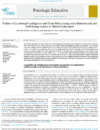Abstract
Research on emotional intelligence (EI) and its relationship with motivational and health factors in educational contexts is scarce.
The objectives of this study were three: (a) to explore emotional intelligence profiles of adolescents; (b) to examine how these profiles relate to different types of motivation, basic psychological needs, friendship goals, subjective well-being, and intentions to be physically active; and (c) to analyze how these emotional profiles evolve during a full year in physical education contexts.
It is a longitudinal study with three measurement occasions. Participants were 282 students (151 boys and 131 girls) from six high schools (Mage = 13.03, SD = 0.93). Hierarchical and k-means cluster analysis were performed, three inter-group MANOVAs (one for each time) and one 2 x 3 (group x time) MANOVA to explore longitudinal changes. Two EI clusters emerged: high EI (n = 168) and low EI (n = 114). Significant effects were found for the group in the three MANOVAs. The high EI cluster was more adaptive, self-determined, with greater psychosocial adjustment, subjective well-being, and intentions to be physically active.



Responses